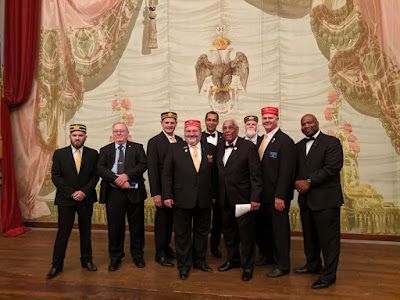(Note: This story has been updated. It mistakenly mis-identified the location as being the Valley of Nashville instead of Memphis.)
Something of a major milestone was just crossed in Tennessee Freemasonry over the weekend. On Saturday, the Scottish Rite (SJ) Valley of Memphis welcomed Tennessee's Prince Hall Scottish Rite Masons to participate in the exemplification of the Southern Jurisdiction's 18th degree, followed by a Friendship Dinner.
Tennessee remains one of just seven U.S. jurisdictions that has not yet adopted mutual recognition between the predominantly white "mainstream" grand lodge and its principally African-American Prince Hall Affiliated counterpart.


A delegation of members from both the Grand Lodge of Mississippi and the
MW Stringer Grand Lodge of Mississippi (PHA) happened to be in attendance -
An interesting development...

Congratulations to both MW Robert Reed and MW Lamont Banks, the Grand Masters of the two jurisdictions, for working to make this happen.

Tennessee's Prince Hall Grand Lodge formally requested recognition by the Grand Lodge of Tennessee several months ago, and their request will be presented at the 2020 annual communication next spring. Grand Lodge officers have been discussing the request at District meetings throughout the state and answering questions. If joint recognition is achieved next year it will make a fitting birthday present for the Prince Hall Masons of Tennessee, who will be celebrating the 150th anniversary of their formal founding in 1870 after the end of the Civil War.
Alabama (2017) and Florida (2019) have been the two most recent states to adopt joint recognition between their mainstream and Prince Hall Affiliated grand lodges. As of today only Arkansas, Georgia, Louisiana, Mississippi, South Carolina, Tennessee, and West Virginia remain officially separated.
What Is Prince Hall Freemasonry?
Prince Hall Freemasonry is named after its founding Master, a manumitted slave and influential early civil rights leader named Prince Hall (d. 1807). A lodge was established in Boston, Massachusetts in 1784 by fifteen free blacks who were granted an English charter as African Lodge 459 by the Premiere Grand Lodge of England (Moderns). Prior to its chartering, Freemasonry had been practiced almost exclusively by white members of America's colonial society.
'Colored' Freemasonry among blacks spread very slowly throughout the growing nation after African Lodge declared itself to be a grand lodge in 1808, and independent of all other grand lodges after 1827. Following the Civil War, black Masonic lodges and grand lodges expanded dramatically. As with nearly every other social and cultural association in the country, the historical result was that two racially segregated threads of American Freemasonry coexisted without cooperation or recognition until joint amity was first adopted in Connecticut in 1989, setting off a national trend in the 1990s.
These threads of American Freemasonry have not officially been segregated since Brown v. Board of Education and the end of Jim Crow-era laws and practices in America by the early 1960s. However, Prince Hall Freemasonry has remained predominantly popular and influential in the African-American community to this day.
Continue reading...

